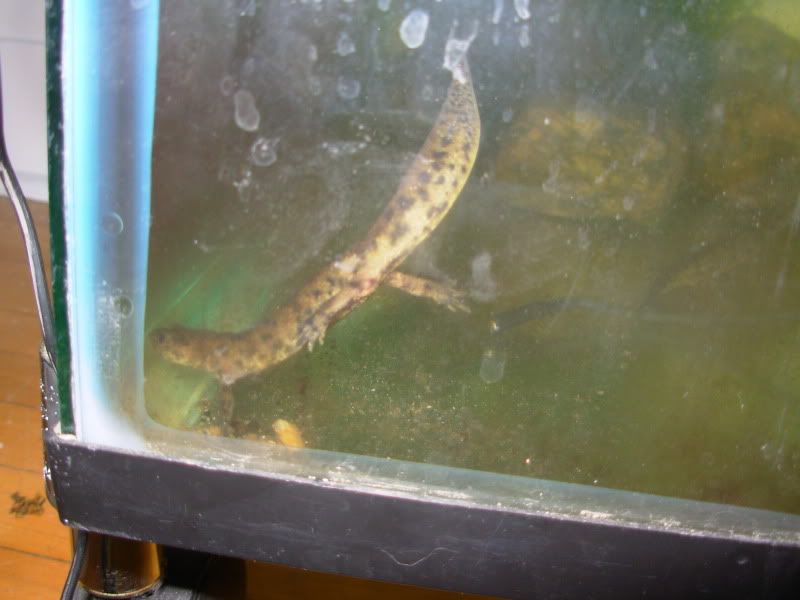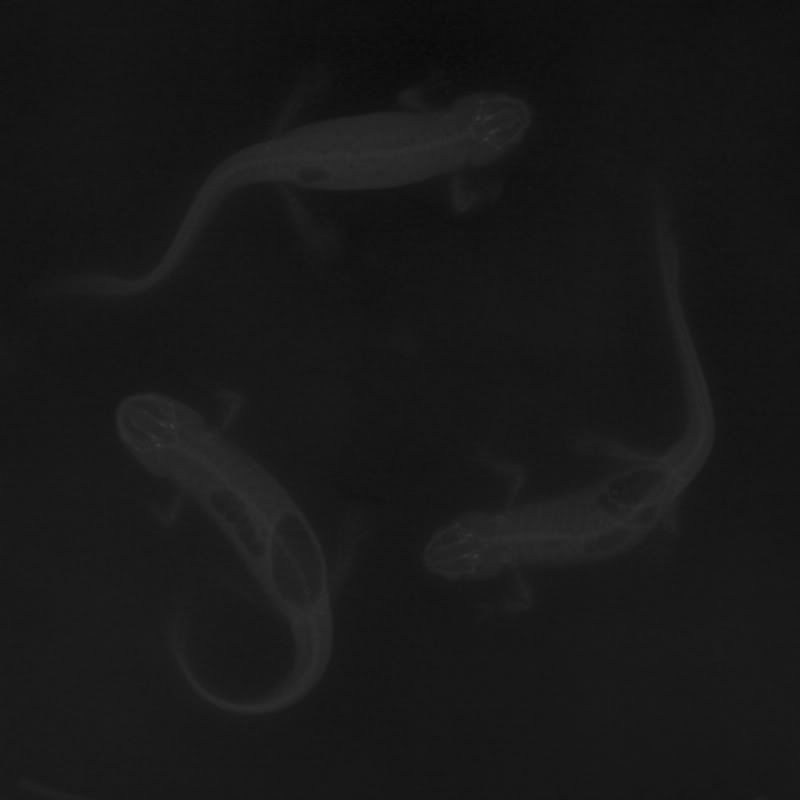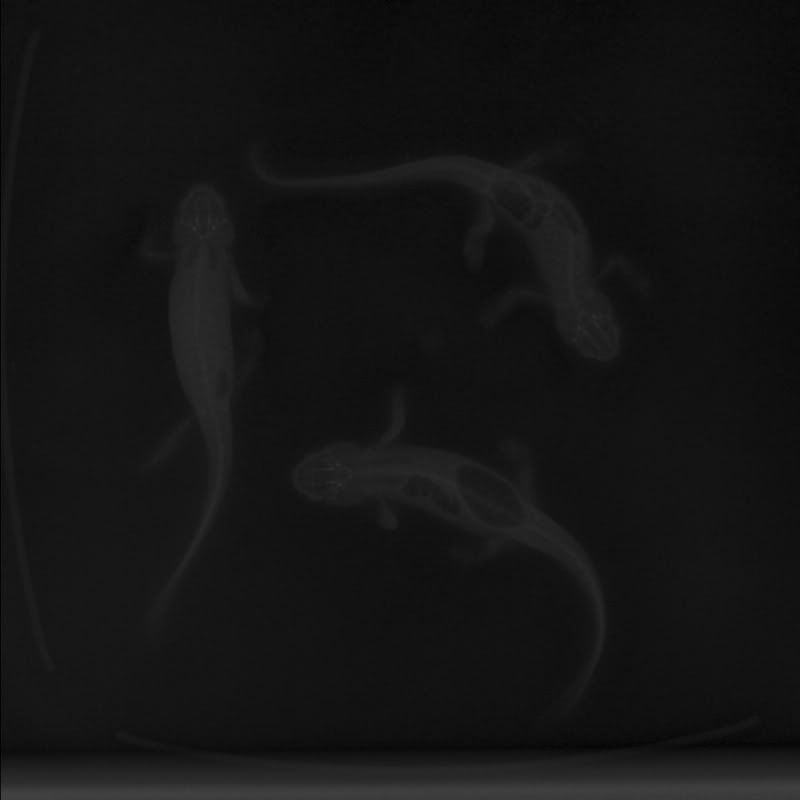Herptiles
New member
- Joined
- Aug 14, 2007
- Messages
- 44
- Reaction score
- 4
- Points
- 0
- Location
- Halifax, Nova Scotia, Canada
- Country
- Canada
- Display Name
- Christina S. Miller
I'm having some weird bloating issues in two of my three CB 2011 (or so the shop claimed) P. waltl.
Housing: 10 gallon aquarium, ~10-15 cm of tap water treated with chlorine/chloramine/heavy metal binder. A few medium-sized rocks and lots of live java moss placed on one end for hiding, feeding is done in the half with no plants. No substrate. No filter. Water temp. is taken with a digital probe thermometre, fluctuates between 20-22 C.
Maintenance: 1/2 to 2/3 water change every 7-10 days. I would remove uneaten food within the day, but they tend to finish everything quickly.
Diet: Fed 2-3 times/week, alternates between live red wiggler earthworms from our vermicomposter, f/t bloodworms and f/t mosquito larvae. I have other groups of newts (Paramesotriton hongkongiensis, P. chinensis, Cynops orientalis) on the same food rotation and only my Pleurodeles have any bloating issues.
The bloating issues started on October 13th. I noticed two of the three newts having difficulty reaching the bottom of the aquarium, as if the caudal part of their coelom was "inflated" and they were fighting against the buoyant force. They did not appear obviously bloated from the outside with inspection.

Water quality was not remarkable: pH 7.5, NO2 0 ppm, NO3 20 ppm, GH 120 ppm, KH 180 ppm. The only potential issue here is that our water is very hard in this municipality, I'm currently checking out some softening options for the sake of the amphibians and my tropical fish.
I brought them into work the same day for x-rays (I am a veterinary nurse/technician) to determine what cavity was bloated:

The one on top in this film is the only "normal" newt, although he obviously has a small amount of gas in his lower bowels. The guy on the lower left has some conspicuously intestinal-looking air contrast, but that larger "bubble" concerns me. It's been a while since I've done a caudate dissection/necropsy, I'm not sure if the colon is so elastic to be distorted so much. On the flipside, if the gas were coelomic in origin, I would expect the gas accumulation to be throughout the coelom, not sectioned off to the caudal portion. The newt on the lower right has more "normal" gassy transparencies.
One more rad:

Considering the above, I figured that they may just be constipated, and some lower GI gas was causing the problem. I fed them a small meal of f/t bloodworms to see if that would improve their GI motility. Low and behold, within another day or two they were back to normal. I continued with their regular feeding and water maintenance schedule.
Now, about a week and a half later, two of them are bloated again (I am suspecting that they are the same two individuals as before).
The bloating seems to be more of an annoyance to the newts than anything, they are not acting sick. Great appetites, they will swim with some effort to reach food at the bottom of the aquarium. When they want to hide, they wedge themselves under the edges of their rocks. I occasionally see them swim frantically to get to the bottom, give up for a minute or two, then mosey on to the sheltered side of the tank.
I tempted to bring in my other newts for some "control" x-rays to compare everyone. I briefly considered doing a fine needle aspirate to give them some relief from the bloating.
Has anyone had this problem, or some ideas for the cause?
Housing: 10 gallon aquarium, ~10-15 cm of tap water treated with chlorine/chloramine/heavy metal binder. A few medium-sized rocks and lots of live java moss placed on one end for hiding, feeding is done in the half with no plants. No substrate. No filter. Water temp. is taken with a digital probe thermometre, fluctuates between 20-22 C.
Maintenance: 1/2 to 2/3 water change every 7-10 days. I would remove uneaten food within the day, but they tend to finish everything quickly.
Diet: Fed 2-3 times/week, alternates between live red wiggler earthworms from our vermicomposter, f/t bloodworms and f/t mosquito larvae. I have other groups of newts (Paramesotriton hongkongiensis, P. chinensis, Cynops orientalis) on the same food rotation and only my Pleurodeles have any bloating issues.
The bloating issues started on October 13th. I noticed two of the three newts having difficulty reaching the bottom of the aquarium, as if the caudal part of their coelom was "inflated" and they were fighting against the buoyant force. They did not appear obviously bloated from the outside with inspection.

Water quality was not remarkable: pH 7.5, NO2 0 ppm, NO3 20 ppm, GH 120 ppm, KH 180 ppm. The only potential issue here is that our water is very hard in this municipality, I'm currently checking out some softening options for the sake of the amphibians and my tropical fish.
I brought them into work the same day for x-rays (I am a veterinary nurse/technician) to determine what cavity was bloated:

The one on top in this film is the only "normal" newt, although he obviously has a small amount of gas in his lower bowels. The guy on the lower left has some conspicuously intestinal-looking air contrast, but that larger "bubble" concerns me. It's been a while since I've done a caudate dissection/necropsy, I'm not sure if the colon is so elastic to be distorted so much. On the flipside, if the gas were coelomic in origin, I would expect the gas accumulation to be throughout the coelom, not sectioned off to the caudal portion. The newt on the lower right has more "normal" gassy transparencies.
One more rad:

Considering the above, I figured that they may just be constipated, and some lower GI gas was causing the problem. I fed them a small meal of f/t bloodworms to see if that would improve their GI motility. Low and behold, within another day or two they were back to normal. I continued with their regular feeding and water maintenance schedule.
Now, about a week and a half later, two of them are bloated again (I am suspecting that they are the same two individuals as before).
The bloating seems to be more of an annoyance to the newts than anything, they are not acting sick. Great appetites, they will swim with some effort to reach food at the bottom of the aquarium. When they want to hide, they wedge themselves under the edges of their rocks. I occasionally see them swim frantically to get to the bottom, give up for a minute or two, then mosey on to the sheltered side of the tank.
I tempted to bring in my other newts for some "control" x-rays to compare everyone. I briefly considered doing a fine needle aspirate to give them some relief from the bloating.
Has anyone had this problem, or some ideas for the cause?
